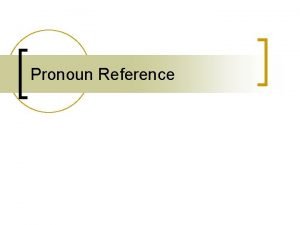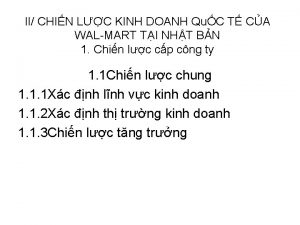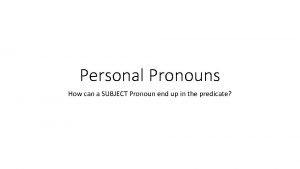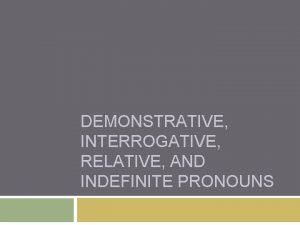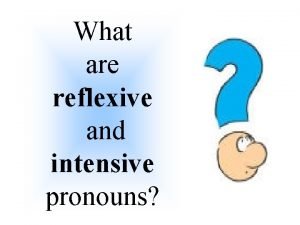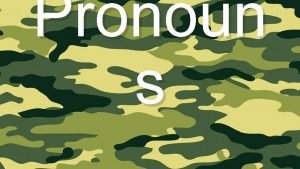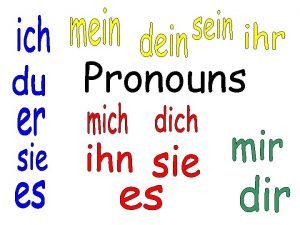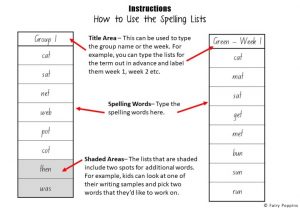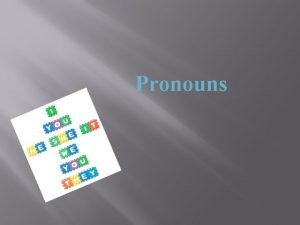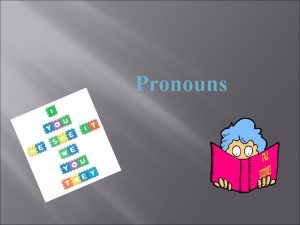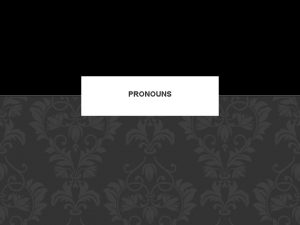Pronouns Pronouns A pronoun is a word that















- Slides: 15

Pronouns

Pronouns A pronoun is a word that takes the place of a noun. Pronouns can be in one of three cases: Subject, Object, or Possessive.

Subject Pronoun Subject pronouns are used as the subject of the sentence. (I, you, he, she, it, we, and they) Example: She is going to the store. Example: They are buying pizza for dinner. Example: I want to travel to Europe.

Object Pronoun Object pronouns are used as the object of the sentence. (me, you, him, her, it, us, and them) Example: Mary doesn’t like him. Example: John wants to talk to you. Example: Lola didn’t invite them.

A visual for you… • • • Subject Pronoun Object Pronoun Singular I you he she it • • • me you him her it Plural • we • you • they Plural • us • you • them

Subject Pronoun singular Object Pronoun singular I Me I talk to you. You talk to me. You You talk to me. I talk to you. Noun for oneself one person I talk to

Subject Pronoun singular Object Pronoun singular He Him He calls you. You call him. She Her She looks at you. You look at her. Noun a male a female It It It is a cat. It is a banana. You feed it. You eat it. an animal, an idea, a place, a situation, a thing, time, weather, an emotion

Subject Pronoun plural Object Pronoun plural We Us We talk together. Someone talks to us. You You learn English. I teach you English. They Them They eat ice cream. Someone gave them ice cream. Noun I + you = we me + you = us they/them can be people or things.

Possessive Pronouns my, mine, ours, its, his, hers, theirs, yours, whose, and one’s Example: One’s treasure is special. Example: Whose book is on our desk? Example: My dog is better than their dog. Example: His hair is longer than hers.

she vs. her Her and I traveled. OR She and I traveled. Each pronoun needs to make sense on its own. Her traveled. I traveled. OR She traveled. I traveled.

he vs. him Him and I read books. OR He and I read books. Each pronoun needs to make sense on its own. Him read books. I read books. OR He read books. I read books.

Don’t combine them! You cannot use a subject pronoun and an object pronoun to represent the subject of a sentence. Example: They and him went to the movies. They is a subject pronoun and him is an object pronoun. You cannot have them used together as the subject of a sentence because it doesn’t make sense. Correct: They and he went to the movies. They went to the movies. He went to the movies.

Don’t combine them! You cannot use a subject pronoun and an object pronoun to represent the object of a sentence either. Example: The kids kicked the ball to him and I. Him is an object pronoun and I is a subject pronoun. You cannot have them used together as the subject of a sentence because it doesn’t make sense. Correct: The kids kicked the ball to him and me. The kids kicked the ball to him. The kids kicked the ball to me.

Which is correct? Him and me cheated on the test. Him and I cheated on the test. He and I cheated on the test.

Which is correct? The teacher passed the paper to she and I. The teacher passed the paper to her and me. The teacher passed the paper to she and me.
 Direct object pronoun
Direct object pronoun Phân độ lown ngoại tâm thu
Phân độ lown ngoại tâm thu Block nhĩ thất cao độ
Block nhĩ thất cao độ Thể thơ truyền thống
Thể thơ truyền thống Thơ thất ngôn tứ tuyệt đường luật
Thơ thất ngôn tứ tuyệt đường luật Walmart thất bại ở nhật
Walmart thất bại ở nhật Tìm vết của mặt phẳng
Tìm vết của mặt phẳng Con hãy đưa tay khi thấy người vấp ngã
Con hãy đưa tay khi thấy người vấp ngã Tôn thất thuyết là ai
Tôn thất thuyết là ai Gây tê cơ vuông thắt lưng
Gây tê cơ vuông thắt lưng Sau thất bại ở hồ điển triệt
Sau thất bại ở hồ điển triệt Me. you. he. she
Me. you. he. she Relative pronoun possessive
Relative pronoun possessive Predicate pronoun example
Predicate pronoun example Interrogative and demonstrative pronouns
Interrogative and demonstrative pronouns What is reflexive or intensive
What is reflexive or intensive
